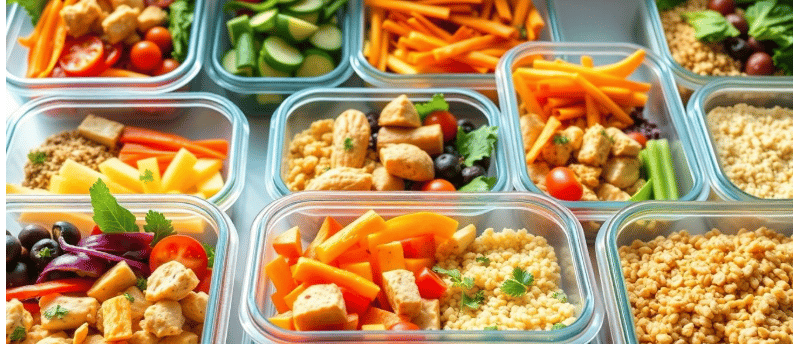Easy Meal Prep Ideas for a Sustainable Diet
Embracing a sustainable diet can feel tough with our busy lives. Meal prepping makes it easier, helping you eat responsibly without added stress. This guide offers easy strategies to reduce food waste and focus on sourcing foods that are good for both you and the planet. Let’s dive into simple meal prep ideas that can elevate your sustainable eating habits.
♻️LIFESTYLE & SUSTAINABILITY


Planning Your Sustainable Meal Prep
Assessing Your Dietary Needs and Preferences
Understanding your dietary preferences is the first step. Consider these questions:
Are you vegetarian, vegan, or omnivorous?
Do you have any food allergies?
What flavors do you love?
Households in the US waste about 31% of all food produced, equivalent to 133 billion pounds each year (USDA). In the EU, citizens waste 88 million tons of food annually (European Commission). Knowing these statistics can motivate you to make more thoughtful choices.
Creating a Weekly Meal Plan
Creating a weekly meal plan keeps you organized. Here’s a simple example:
Monday: Lentil soup with seasonal vegetables
Tuesday: Quinoa salad with roasted sweet potatoes
Wednesday: Chickpea curry and brown rice
Thursday: Stir-fried tofu with broccoli
Friday: Vegetable-filled wraps with homemade hummus
For seasonal produce, visit local farmers’ markets or check what’s available in your grocery store. Using a meal planning app can simplify this process further.
Sustainable Pantry Staples
Building a Sustainable Pantry
Stocking your pantry with the right staples makes meal prep smoother. Essential items include:
Beans (black, kidney, etc.)
Lentils (red, green)
Whole grains (brown rice, quinoa)
Nuts and seeds (almonds, chia seeds)
Choosing bulk options reduces packaging waste and helps the environment. Store items in airtight containers to maintain freshness and reduce waste.
Sourcing Sustainable Ingredients
Opting for local food brings fresher ingredients to your table. Farmers' markets or ethical brands offer food that has less environmental impact. Brands like Organic Valley and Thrive Market focus on sustainable practices. The transportation of food accounts for 11% of global greenhouse gas emissions (FAO).
Easy Recipes for Sustainable Meal Prep
Batch Cooking Vegetarian/Vegan Meals
Here are two simple recipes perfect for meal prep:
1. Lentil Soup
Ingredients: Lentils, carrots, onions, celery, vegetable broth, spices.
Nutritional Info: High in protein, fiber, and iron.
2. Quinoa Salad
Ingredients: Quinoa, bell peppers, cucumbers, parsley, lemon juice.
Nutritional Info: Rich in protein and vitamins.
Eating plant-based meals can cut your food-related carbon footprint by up to 50% (Nature).
Sustainable Protein Sources
Sustainable proteins are crucial for a balanced meal. Options include:
Lentils
Beans
Tofu
Sustainably sourced fish
Cooking lentils, for instance, boosts their protein absorption. Add herbs for flavor and extra nutrients.
Smart Storage and Leftover Management
Efficient Food Storage Techniques
Proper storage helps keep food fresh and prevents waste. Consider options like:
Glass containers
Reusable plastic bags
Label containers with dates to track freshness. Studies show that 20% of food waste occurs because of improper storage (FAO).
Creative Ways to Use Leftovers
Transforming leftovers cuts down on waste. Here are some ideas:
Use leftover grains in stir-fries.
Blend leftover vegetables into soups.
Cook extra beans for salads or dips.
Freezing leftovers can help preserve meals. Use freezer-safe containers and label them clearly.
Tips for Reducing Food Waste
Planning and Shopping Strategically
Create a shopping list based on your meal plan. This prevents impulse buys and helps stick to necessary items. Mindful shopping reduces waste significantly, as noted by food waste experts.
Composting Food Scraps
Composting is a fantastic way to manage food scraps. Starting a compost bin at home is simple. Methods vary from backyard composting to vermicomposting with worms. Composting can reduce landfill waste by 30% (EPA).
Conclusion: Making Sustainable Eating a Habit
Sustainable meal prepping makes a big difference. By planning meals, sourcing responsibly, and managing leftovers, you contribute positively to the environment. Start small and gradually incorporate these tips into your routine. Sustainable eating can fit seamlessly into your lifestyle while benefiting both you and the planet.
